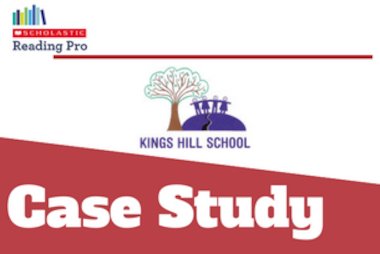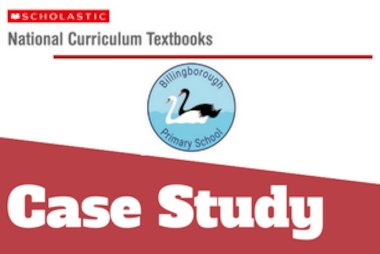Caroline Chisholm School Case Study
Caroline Chisholm School, an academy in Northampton, has used the Scholastic Reading Audit to reinvigorate its approach to primary phase literacy after identifying a need to improve reading progress between Key Stage 1 and Key Stage 2. Emma Langridge, a Lead Practitioner at the school, explained that whilst the school is well above national average in reading at Key Stage 1 and Key Stage 2, progress between the key stages is average. This was highlighted as a weakness by Ofsted in September 2017 and subsequently there was a need to review the school’s approach to reading.
“The Scholastic Reading Audit came along at exactly the right time,” Emma said. “Colleagues were questioning whether guided reading was the best approach and, as a school, we were considering dropping it and replacing it with whole-class reading. That didn’t feel right to me and I needed to find some independent evidence for maintaining the guided reading strategy.”
The audit was great –
the report we received
back mentioned whole class
reading but it also
prompted different things
around guided reading,
especially new ideas
around reciprocal reading
The audit helps teachers to evaluate their school’s reading performance across 12 types of reading – a simple ‘red, amber,
green’ rating system highlights reading strengths and identifies areas for development. Having completed the audit, Emma shared the report with her Headteacher. “The audit was great – the report we received back mentioned whole-class reading but it also prompted diff erent things around guided reading, especially new ideas around reciprocal reading and close reading,” she said.
“It explains what these are, how these can be implemented and subsequently their recommendations. The fact that an organisation with Scholastic’s credibility outlined the best way forward with reading was hugely important. It gave me the evidence to make a case to our Head, at a time when many schools are moving away from guided reading.”
Caroline Chisholm has worked with Scholastic for many years and signed up to the Connectors programme in 2017. Connectors is a groundbreaking reciprocal reading series for peer-to-peer learning which sees children working in independent groups of up to six, as they read and debate a book together. Clear prompts show the leader how to focus the discussion and work with their team to predict outcomes, clarify issues, ask questions and evaluate content. This collaborative approach, recommended by the Education Endowment Foundation, develops teamwork as well as speaking, listening, comprehension and evaluation skills. Formal classroom trials of Connectors show children’s reading age leaping forward by an average of 9.1 months in just 12 weeks.
“The books arrived at the beginning of this term, we have delivered training to all staff , and this is now being launched in the classroom,” Emma said. We are strict on measurement and will continually evaluate it but we have also introduced other whole-school interventions, as part of our strategy. At a time when we felt unsure about continuing guided reading, the Scholastic Reading Audit was great. It clarified valuable strategies to be used in guided reading and provided guidance on the areas we were falling short, such as the independent tasks. It was the springboard for us to revamp and embrace guided reading.”
Emma praised the role of Scholastic in helping to address some of their most pressing school improvement challenges: “I had not really explored Scholastic’s resources or associated them with research prior to completing the audit, but both have been brilliant. Again, to have a respected body like Scholastic saying that guided reading is the right thing to do provided reassurance for me and helped me make my case for the continuation of this strategy.”
Take the Scholastic Reading Audit here and click here to find out more about the Connectors Reading Programme.
Similar Posts
-

Kings Hill School Case Study
A case study on the use of the Scholastic Reading Audit and Scholastic Reading Pro in Kings Hill School.
-

Connectors: ‘A Walk In My Shoes’ by Kate Chandulal
Diagnosed with scoliosis at birth and contracting meningitis aged 5, life has been anything but ordinary for Kate Chandulal. As part of our ‘Connectors’ series, we’re publishing Kate’s story, ‘A Walk In My Shoes’, where…
-

Billingborough Primary School Case Study
A case study on the use of the Scholastic National Curriculum Textbooks in Billingborough Primary School.
